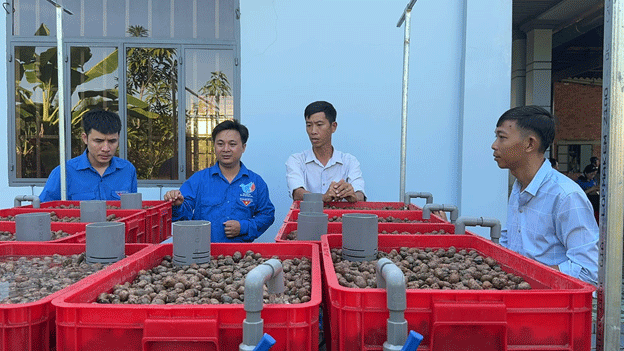In a proactive move to promote sustainable agriculture, the Science and Technology Center of Tây Ninh Province, in collaboration with Thành Đoàn Tây Ninh, recently launched a five-day aquaponics training program for more than 30 youth leaders and community members in Ninh Sơn and Tân Bình. This training offers a comprehensive introduction to aquaponics, an innovative system that combines fish farming and hydroponic vegetable cultivation in a single closed-loop environment, enabling the production of fresh food with minimal resources.
Aquaponics represents a symbiotic ecosystem: fish provide organic waste, which is converted by beneficial bacteria into nutrients for plants. These plants, in turn, help purify the water, which then cycles back to the fish tanks. By utilizing this natural filtration and nutrient recycling, aquaponics reduces the need for fertilizers, pesticides, and large amounts of water, addressing key environmental challenges in modern agriculture.
Hands-On Learning for Practical Skills
Participants in the Tây Ninh training program gain hands-on experience in constructing and operating a functional aquaponics system. The course covers essential system components such as fish tanks, water pumps, filtration units, vegetable growing beds, siphon drainage systems, and electrical circuits. Learners are trained to install and maintain these elements, enabling them to build their own systems and troubleshoot common operational issues.
The 3-square-meter aquaponics model introduced in the training costs around 23 million VND ($950 USD) to set up. This compact system is sufficient to produce fresh vegetables and fish for daily consumption for a family of up to seven members, underscoring the model’s potential to enhance food security in local communities.
Environmental and Economic Benefits
The aquaponics model offers a range of benefits, particularly in regions facing water scarcity or limited arable land. With water usage reduced by up to 90% compared to traditional farming methods, aquaponics provides an efficient, soil-free alternative for growing nutritious food. Additionally, because the system relies on natural biological processes rather than chemical fertilizers or pesticides, it produces high-quality organic produce and fish with minimal environmental impact.
The Tây Ninh program encourages participants to cultivate economically valuable crops such as water spinach, lettuce, mustard greens, cucumbers, and tomatoes, as well as herbs like basil, chili, and green onions. Tilapia, catfish, and gourami are among the fish species suitable for this system, providing a reliable protein source alongside fresh vegetables. The program aligns with broader efforts to promote organic farming and food safety, giving communities access to clean, locally produced food.
Enhancing Knowledge and Economic Growth
This training aims to raise awareness of modern science and technology applications among Tây Ninh’s youth and foster an innovative mindset geared toward practical, environmentally friendly solutions. By equipping local farmers and young people with these skills, Tây Ninh is setting an example for sustainable development and community-led economic growth. The successful implementation of these techniques could inspire similar projects throughout Vietnam, supporting local economies and improving livelihoods.
The aquaponics training initiative in Tây Ninh exemplifies how science and technology can be harnessed to promote sustainable agricultural practices. By empowering youth with the skills to implement and manage aquaponic systems, the program not only addresses local food security but also contributes to broader goals of environmental conservation and economic self-sufficiency. As communities increasingly adopt these models, aquaponics has the potential to become a cornerstone of sustainable food production in Vietnam.












